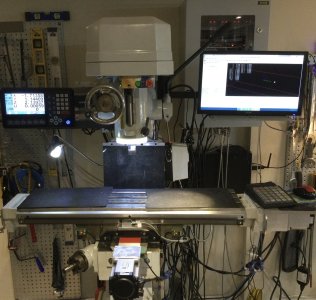PatrickT
Active Member
About to purchase my first Milling machine. I've been making due with some pretty rudimentary tools, but have decent skill sets on fabrication & design, and since getting a lot of "hey, can you make me one of those?" requests, I figured I should dive right in.
There are soooo many options, and lots of constraints; budget, reliability, size etc, so please review my thought process and tell me where I should spend my wife's kitchen reno budget...
Objectives
-Prototyping parts in wood, composites & aluminum. Fabricating composites molds. Building tooling & modifying tools for CNC, DRO, etc.
-Primary focus is firearms restorations; long rifles, militaria,; this includes wooden & composite stock work (33" long), and lots of small, moderately precise metal work.
Plan A:
-Buy a used mini mill, like a king KC20 or similar clone, learn milling, setup and the CNC conversion process, then move up to a knee mill like a PM 900 series.
*This gets me into a mill, well equipped for under $3.5k, with little risk from damage during the learning curve, and offers a second mill available for projects when the larger mill is designated to a specific work scope. It limits initial production, but perhaps lets me gauge if a new shop space is in order, and what my requirements really are.
Plan B:
-Buy a used Craftex CX601, dress it up, then replace it once in a few years with a substantial and accurate CNC mill, either turn key or conversion style.
*This gets me into a somewhat capable machine, well equipped for $5.5K, that could potentially serve as a primary lathe for a couple years, and have good resale towards a larger setup, but tooling could potentially move to the new setup. A cost effective solution, but not really a huge savings on time, and will inevitably leave me wishing for bigger, better, I think.
Plan C:
-Buy a Mathews PM-949TV from the start, loaded to the gills.
*This will be a forever machine, but financially feasible through modest financing. I'll never want for more, but fear the initial $20k budget will grow exponentially as I try to build it up.
I'm not in a rush, but do want to dive into it. Any insight greatly appreciated.
Patch
There are soooo many options, and lots of constraints; budget, reliability, size etc, so please review my thought process and tell me where I should spend my wife's kitchen reno budget...
Objectives
-Prototyping parts in wood, composites & aluminum. Fabricating composites molds. Building tooling & modifying tools for CNC, DRO, etc.
-Primary focus is firearms restorations; long rifles, militaria,; this includes wooden & composite stock work (33" long), and lots of small, moderately precise metal work.
Plan A:
-Buy a used mini mill, like a king KC20 or similar clone, learn milling, setup and the CNC conversion process, then move up to a knee mill like a PM 900 series.
*This gets me into a mill, well equipped for under $3.5k, with little risk from damage during the learning curve, and offers a second mill available for projects when the larger mill is designated to a specific work scope. It limits initial production, but perhaps lets me gauge if a new shop space is in order, and what my requirements really are.
Plan B:
-Buy a used Craftex CX601, dress it up, then replace it once in a few years with a substantial and accurate CNC mill, either turn key or conversion style.
*This gets me into a somewhat capable machine, well equipped for $5.5K, that could potentially serve as a primary lathe for a couple years, and have good resale towards a larger setup, but tooling could potentially move to the new setup. A cost effective solution, but not really a huge savings on time, and will inevitably leave me wishing for bigger, better, I think.
Plan C:
-Buy a Mathews PM-949TV from the start, loaded to the gills.
*This will be a forever machine, but financially feasible through modest financing. I'll never want for more, but fear the initial $20k budget will grow exponentially as I try to build it up.
I'm not in a rush, but do want to dive into it. Any insight greatly appreciated.
Patch


